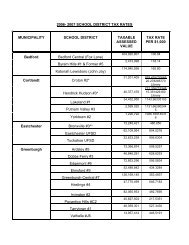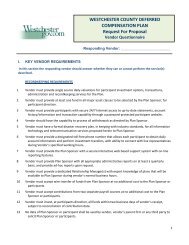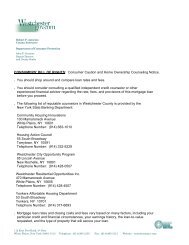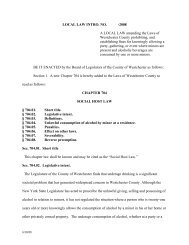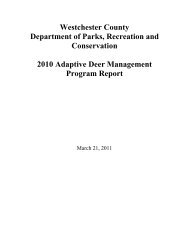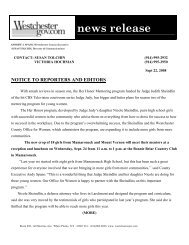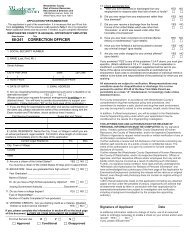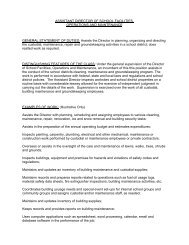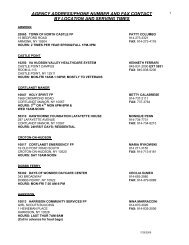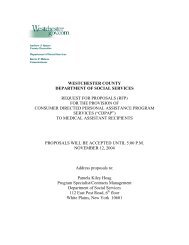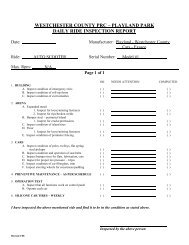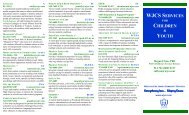Westchester Action Plan, 2008 - Westchester County Government
Westchester Action Plan, 2008 - Westchester County Government
Westchester Action Plan, 2008 - Westchester County Government
You also want an ePaper? Increase the reach of your titles
YUMPU automatically turns print PDFs into web optimized ePapers that Google loves.
• Contraction of the Greenland ice sheet will continue and contribute to sea level rise.<br />
• Coastal communities and habitats will be increasingly stressed by climate<br />
change impacts interacting with development and pollution.<br />
• When the global average temperature increase exceeds about 6.3°F, significant<br />
species extinctions will occur (40-70 percent of species assessed) around the globe.<br />
Climate change has the potential to yield continued adverse impacts on ecological,<br />
economic, and social systems, which will be experienced at every level of society. Those in<br />
the weakest economic position are often the most vulnerable to climate change. There is<br />
increasing evidence of greater vulnerability of specific groups such as the poor and elderly<br />
in not only developing but also developed countries, and even in places like <strong>Westchester</strong>.<br />
How Will Climate Change Affect <strong>Westchester</strong> <strong>County</strong><br />
The Northeast Climate Impacts Assessment (NECIA), a collaboration between the Union of<br />
Concerned Scientists (UCS) and a team of more than fifty independent experts, has<br />
assessed climate change and the resulting impacts within the Northeast. According to the<br />
NECIA report, Confronting Climate Change in the U.S. Northeast 2007 ii the local seasonal<br />
climate, characterized by snowy winters, verdant springs, humid summers, and brilliant<br />
autumns, with infrequent events such as nor’easters, ice storms, and heat waves, is in the<br />
process of changing. Using multiple climate change models and assuming that emissions<br />
are uncurbed, the NECIA study predicts that winters could warm by 8 to 12°F and that<br />
summers could warm by 6 to 12 o F by late this century. Associated with this warming will<br />
be disruptive impacts on coastal areas, marine habitats, forests, agriculture, and human<br />
health. Associated with these impacts will also be substantial economic and social<br />
disturbance.<br />
The number of days over 90°F in large<br />
Northeastern cities is projected to<br />
increase in the coming decades. The<br />
box shows the increase in days over<br />
100°F.<br />
Source: Confronting Climate Change<br />
in the U.S. Northeast 2007.<br />
Attachment 1: Climate Change, Global Warming, and <strong>Westchester</strong><br />
<strong>Westchester</strong> <strong>Action</strong> <strong>Plan</strong>, <strong>2008</strong> 1-3



